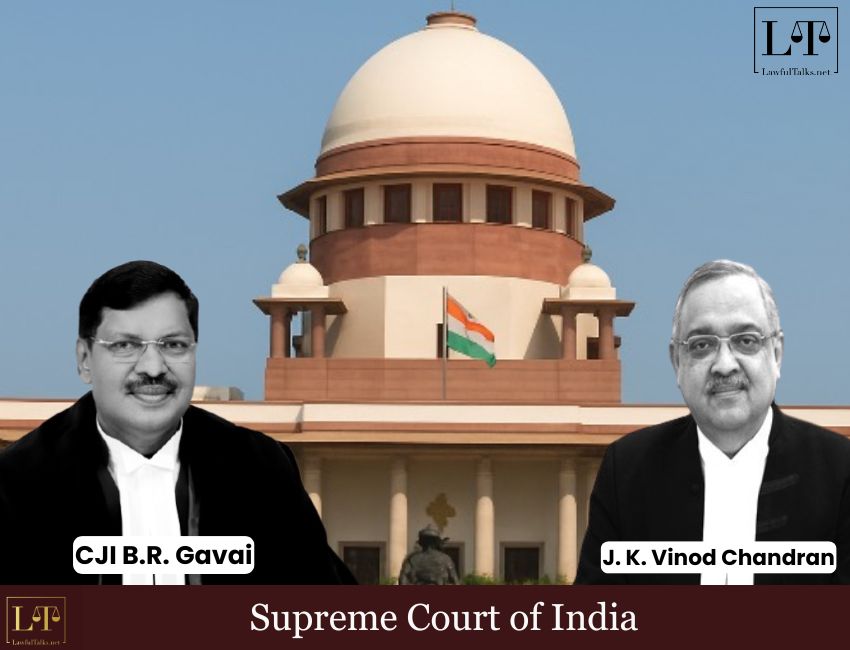Allahabad HC Sets Aside Afzal Ansari's Conviction, Allows Him to Continue as MP

In a key judgment delivered recently, a Supreme Court Bench headed by Chief Justice of India (CJI)B.R. Gavai and Justice K. Vinod Chandran ruled that First Information Reports (FIRs) registered in connection with different transactions across multiple States cannot be merged into a single, nationwide case.

While refusing the request for country-wide consolidation, the Court clarified that FIRs arising from related incidents within the same State may be clubbed together.
Brief Facts:
The petitioners were linked to the management and operations of a firm accused of diverting funds collected from unsuspecting depositors. Multiple FIRs alleging large-scale financial fraud had been registered across several States, including Telangana, Maharashtra, Karnataka, West Bengal, Delhi, Andhra Pradesh and Rajasthan.
The petitioners approached the Supreme Court under its criminal writ jurisdiction seeking (i) transfer and clubbing of all existing FIRs across the country into one and (ii) a direction that any future FIRs be similarly consolidated.
The plea was opposed by the State of Telangana, where the highest number of FIRs had been filed by the Economic Offences Wing (EOW), Cyberabad. Telangana argued that although the modus operandi may be similar, each complaint involved distinct facts, victims, local witnesses, and different statutory regimes (such as the Telangana Protection of Depositors of Financial Establishments Act, 1999).
The Judgment
Justice K. Vinod Chandran, described the relief sought as “overambitious and outright illegal.” The Court pointed out that consolidation of future FIRs is beyond the power of any court. The Court noted that earlier rulings like Radhey Shyam and Amandeep Singh Saran were different, as those cases involved either the consent of the States concerned or the Supreme Court’s limited use of its powers under Article 142.
The Bench also considered the petitioners’ reference to Amish Devgan v. Union of India, where multiple FIRs linked to a single TV broadcast were combined into one case.
Justice Chandran drew a sharp distinction between that situation and the present one. Distinguishing Amish Devgan's case from the present case, the judgment authored by Justice Chandran observed:
“It has to be noticed that therein (Amish Devgan's case), the offence was one, of an alleged objectionable statement leading to hurting of religious sentiments telecast in a television show; which stands distinct from the instant case wherein FIRs were registered on the complaints of the investors of depositors who were alleged to have been duped by the firm diverting the funds leading to loss of their life's savings. We cannot forget that after investigation if a charge sheet is filed, the trial will have to be proceeded with, producing witnesses, being the investors of depositors, from the various locations. In which event the clubbing of FIRs from all the States would not be practical.”
However, the Court clubbed the FIRs registered in each State.“As we noticed, in Telangana there were 4 crimes registered, three by the Economic Offences Wing, Cyberabad and one in Madhapur, Cyberabad. Hence the FIR registered in Madhapur, Cyberabad will stand transferred to Economic Offences Wing, Cyberabad. In the State of Maharashtra, there are two FIRs registered, One in Ambazari, Nagpur city and the other in Wagle Estate, Thane City. The FIR 210 of 2025 registered in Wagle Estate, Thane City will be transferred to Ambazari, Nagpur City. The clubbing of the single FIRs filed in the State of Karnataka, West Bengal, Delhi, Andhra Pradesh and Rajasthan stand rejected.”, noted the court, thereby allowing FIRs to be combined only within the same State.
It further ordered trial courts to grant reasonable costs to witnesses for their travel and accommodation if they are required to testify at a different location due to this limited transfer.
Recognising that some petitioners were already in custody, the Bench granted interim protection: those in jail were directed to be released on bail subject to conditions imposed by jurisdictional magistrates.
Those against whom warrants were pending were protected from arrest for six months to enable them to seek regular bail before the respective courts.
Finally, the writ petitions were disposed of with these directions.
Case Title: Odela Satyam & Anr. Versus The State of Telangana & Ors

Het Dedhia
3rd Year Law Student from SVKM's Pravin Gandhi College of Law
Latest Posts
Categories
- International News 19 Posts
- Supreme Court 390 Posts
- High Courts 383 Posts



















































































































































































































































































































































































































































































































































































































































































































































































































